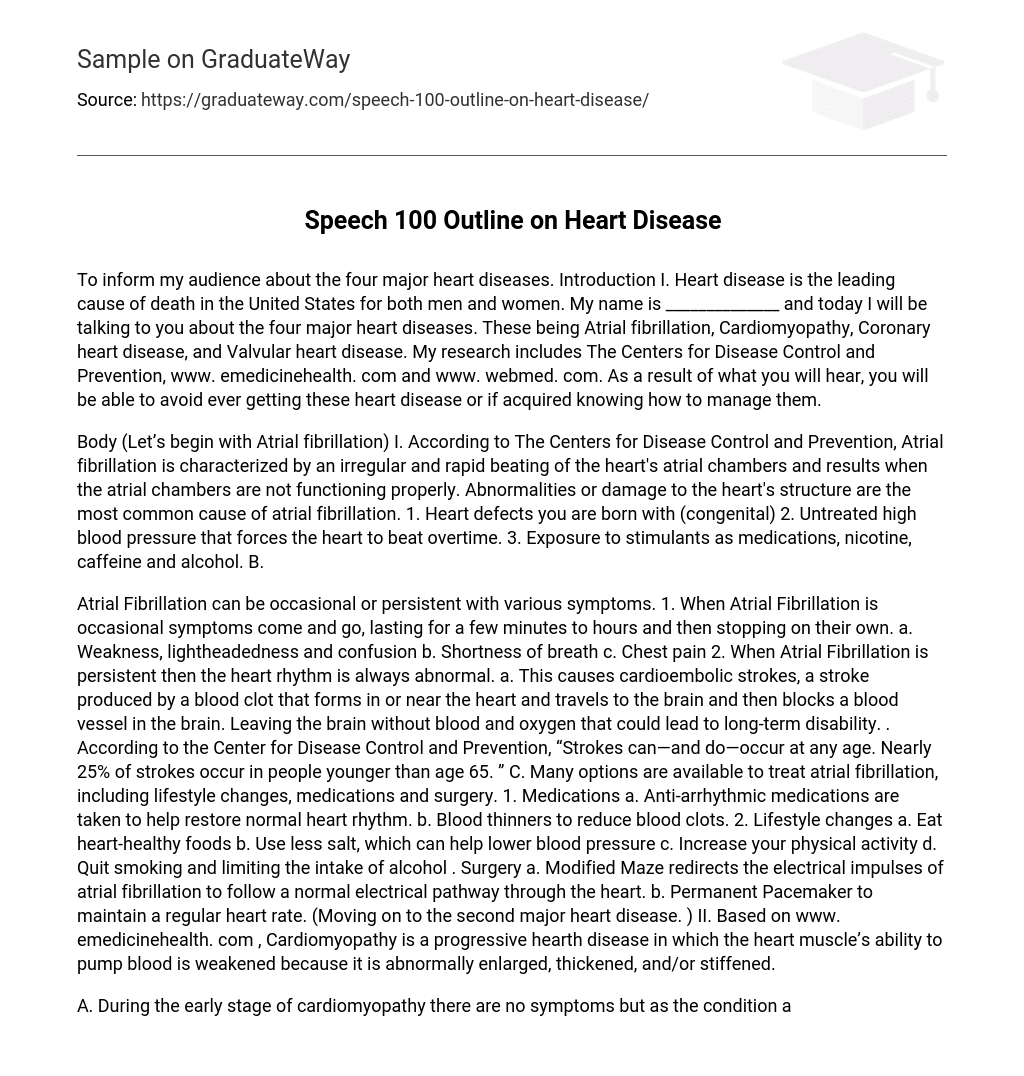To inform my audience about the four major heart diseases. Introduction I. Heart disease is the leading cause of death in the United States for both men and women. My name is ______________ and today I will be talking to you about the four major heart diseases. These being Atrial fibrillation, Cardiomyopathy, Coronary heart disease, and Valvular heart disease. My research includes The Centers for Disease Control and Prevention, www. emedicinehealth. com and www. webmed. com. As a result of what you will hear, you will be able to avoid ever getting these heart disease or if acquired knowing how to manage them.
Body (Let’s begin with Atrial fibrillation) I. According to The Centers for Disease Control and Prevention, Atrial fibrillation is characterized by an irregular and rapid beating of the heart’s atrial chambers and results when the atrial chambers are not functioning properly. Abnormalities or damage to the heart’s structure are the most common cause of atrial fibrillation. 1. Heart defects you are born with (congenital) 2. Untreated high blood pressure that forces the heart to beat overtime. 3. Exposure to stimulants as medications, nicotine, caffeine and alcohol. B.
Atrial Fibrillation can be occasional or persistent with various symptoms. 1. When Atrial Fibrillation is occasional symptoms come and go, lasting for a few minutes to hours and then stopping on their own. a. Weakness, lightheadedness and confusion b. Shortness of breath c. Chest pain 2. When Atrial Fibrillation is persistent then the heart rhythm is always abnormal. a. This causes cardioembolic strokes, a stroke produced by a blood clot that forms in or near the heart and travels to the brain and then blocks a blood vessel in the brain. Leaving the brain without blood and oxygen that could lead to long-term disability. . According to the Center for Disease Control and Prevention, “Strokes can—and do—occur at any age. Nearly 25% of strokes occur in people younger than age 65. ” C. Many options are available to treat atrial fibrillation, including lifestyle changes, medications and surgery. 1. Medications a. Anti-arrhythmic medications are taken to help restore normal heart rhythm. b. Blood thinners to reduce blood clots. 2. Lifestyle changes a. Eat heart-healthy foods b. Use less salt, which can help lower blood pressure c. Increase your physical activity d. Quit smoking and limiting the intake of alcohol . Surgery a. Modified Maze redirects the electrical impulses of atrial fibrillation to follow a normal electrical pathway through the heart. b. Permanent Pacemaker to maintain a regular heart rate. (Moving on to the second major heart disease. ) II. Based on www. emedicinehealth. com , Cardiomyopathy is a progressive hearth disease in which the heart muscle’s ability to pump blood is weakened because it is abnormally enlarged, thickened, and/or stiffened.
A. During the early stage of cardiomyopathy there are no symptoms but as the condition advances, signs and symptoms usually appear. . Long-term high blood pressure 2. Excessive use of alcohol and abuse of medications 3. Iron buildup in your heart muscle (hemochromatosis) B. Cardiomyopathy symptoms progress and worsen as heart function worsens. 1. Weight gain 2. Fainting, dizziness and lightheadedness 3. Blood clots due to blood flowing more slowly through the body C. Cardiomyopathy can be treated by medications and surgery. 1. Medications increase the strength of the heart muscle to improve the heart’s pumping capability. Surgery is used to destroy a portion of the thickened heart muscle. Now lets focus on the third major heart disease) III. According to www. webmed. com, Coronary heart disease is a condition in which plaque builds up inside the coronary arteries and narrows the passage for nutrients to get to the heart. A. Coronary heart disease is caused by any problem with the coronary arteries that keeps the heart from getting enough oxygen- and nutrient-rich blood. 1. Heredity 2. High cholesterol and blood pressure B. Symptoms usually occur during exercise or activity because the heart muscles increased demand for nutrients and oxygen that are not being delivered as fast. 1.
Cardiac arrest is the major symptom of coronary heart disease. This is where the heart usually continues to beat but blood flow to the heart is blocked. C. Medications and Lifestyle changes are needed to treat Coronary heart disease. 1. Medications are used to treat high blood pressure, diabetes, or high cholesterol levels. 2. Lifestyle changes can lower high blood pressure, high cholesterol levels and manage diabetes. a. Avoid or reduce the amount of salt b. Get regular exercise and maintain a healthy weight Keeping blood sugar under control to manage diabetes (Finally the fourth major heart disease)
IV. According to The Centers for Disease Control and Prevention, Valvular heart disease is characterized by damage to or a defect in one of the four heart valves: the mitral, aortic, tricuspid or pulmonary. A. Valve disease can develop before birth (congenital) or can be acquired sometime during one’s lifetime. 1. Untreated bacterial infection can cause valvular heart disease. a. Strep throat b. Strep throat is a bacterial infection in the throat and the tonsils. 2. A congenital disorder may be the result of genetics. B. Symptoms do not always relate to the seriousness of your valve disease. . Palpitations which is a rapid heart rhythm, irregular heartbeat, skipped beats or a flip-flop feeling in the chest. 2. Swelling of your ankles, feet or abdomen C. Valvular heart disease can be treated by medications and surgery. 1. Medications treat the symptoms and lessen the chance of further valve damage. 2. Surgical options include heart valve repair or replacement. Conclusion So now that you know about the four major heart disease, I hope that you make positive changes in your life that will help you live a healthier life. Always remember a healthier heart starts with you.





